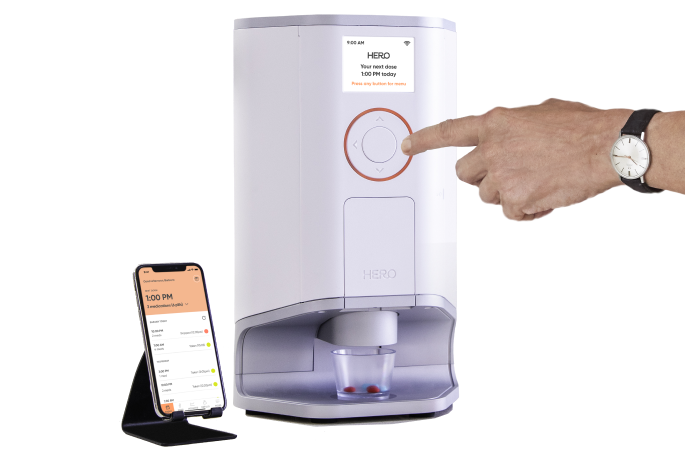Medication Non-Adherence: America’s 100 Billion Dollar Healthcare Problem

About the Author: Stephen J. Kogut PhD MBA RPh is a pharmacist and professor at the University of Rhode Island College of Pharmacy, where he conducts research on medication adherence, prescription drug cost and patient health outcomes.
Edited by Léa Bourgade, Content and Community Manager at Hero.
It's a bustling night in the city emergency department:
In one room lies a woman with diabetes who is recovering from a severe hypoglycemic event. Several months ago, she cut back on her medication due to its high cost. She did not report this to her doctor during a recent office visit, and because her blood sugar was elevated the doctor increased her medication. The higher dose sent the woman into hypoglycemic shock. An elderly man is receiving care after suffering a severe stroke. He has atrial fibrillation and is prescribed a blood-thinning medication, which he often forgets to take.
In another room, a woman is receiving a breathing treatment. Last year her doctor prescribed a daily preventive medication to prevent her asthma attacks. Because she usually experiences relief from her rescue inhaler, she did not take the preventive medication faithfully. But today the inhaler did not relieve her shortness of breath.
Although these high-risk patients have unique health emergencies, they have all fallen victim to poor medication use.
The failure to take medications as prescribed has been called “America’s other drug problem"1 and this problem is as old as the history of medication itself. Even the father of medicine Hippocrates urged that doctors “…should keep aware of the fact that patients often lie when they state that they have taken certain medicines.”2
Yet this problem is not a matter of blaming patients. There are an array of reasons why people have difficulty taking medications as prescribed, and addressing the problem requires a multifaceted approach.
What is medication non-adherence, and how does it impact the health of Americans? More importantly, what are the causes of medication non-adherence, and how can it be prevented, so that trips to the emergency department are avoided?
What is Medication Adherence?
Formerly known as medication compliance, medication adherence is the extent to which patients take prescription medication as directed. This involves obtaining the medication from the pharmacy and using a medication according to the instructions provided, without skipping doses or stopping it altogether.
As highlighted in the patient scenarios above, medication non-adherence--i.e., the failure to take medication as prescribed--can be intentional or unintentional. Unintentional lapses in medication adherence can occur from forgetfulness, or misunderstanding instructions. In contrast, intentional lapses in medication adherence reflect a person’s notions about their health and their beliefs about medication. For example, a person may believe that a medication prescribed for daily use only needs to be taken when symptoms arise. Or perhaps they are reluctant to take a medication after reading about its potential side effects, or to take a drug that caused a problem for a family member.
It is important to note that adherence is a behavior requiring both motivation and action. As we all know, changing health behaviors can be extremely difficult. Sticking to a diet, maintaining an exercise program and even improving habits in medication taking can be a great challenge, even for the most motivated person. For these reasons, intentional non-adherence can be especially difficult to address. But whether intentional or unintentional, medication non-adherence causes many serious health problems.
What are the consequences of medication non-adherence?
The failure to take medications as prescribed is a pervasive and deadly problem.
More than 100,000 Americans die each year from medication non-adherence, a number that exceeds the number of deaths from influenza, pneumonia or car accidents.3,4 Put another way, medication non-adherence would rank as the 7th leading cause of death in the United States.
Medication non-adherence also causes excess use of health care. Up to 10% of hospital admissions are due to medication non-adherence.5 Moreover, medication non-adherence has been found to double the likelihood of hospital readmission within 1 month after discharge.6
The failure to take medications as prescribed also has an enormous impact on health care spending. The cost of medication non-adherence and other medication-related problems exceeds $500 billion annually.7 This is roughly the same amount that was spent for all prescription drugs dispensed to every American in 2019.8
Case Study: Non-Adherence in Cardiovascular Disease and Cancer
Let’s consider the top two causes of death in the US: cardiovascular disease and cancer. A majority of US adults have elevated blood pressure, yet as many as half do not take medication as prescribed.9 Non-adherence with antihypertensive medication has been associated with increased rates of stroke and heart attack.10,11 The risk of death from cardiovascular disease can also be reduced by cholesterol medications such as Lipitor™, yet less than 60% of patients are adherent.12
Medication non-adherence is also a substantial problem among patients with cancer. Despite the gravity of a cancer diagnosis, the complexity of the drug regimen, side effects, and a high cost of treatment can impair the ability of patients to adhere to their medication. More than 1 in 5 women are non-adherent with medication for breast cancer, and even higher rates of medication non-adherence have been found among patients with myeloma and leukemia, which can result in a shorter time of survival.13,14,15
In addition to causing poorer health outcomes in heart disease and cancer, medication non-adherence has been linked with worse outcomes in many other chronic diseases. Whether as a patient or as a family member, medication non-adherence is a problem that affects nearly everyone, causing undue suffering and stealing years of life.
––
So why isn’t more being done to address this urgent problem? Unfortunately, it is quite difficult to measure medication adherence in a reliable and practical manner. Unlike clinical markers of disease progression that can be measured with a lab test or stethoscope, there is no gold standard for determining if a person has been taking their medication. Nevertheless, clinicians and health insurers evaluate medication adherence as best they can, using objective and subjective measurements.
How is Medication Adherence Measured?
Objective measures of adherence include monitoring a person’s medication use by direct observation, or examining prescription refill patterns using data provided by pharmacies.
The direct observation of medication use is commonly utilized in clinical trials evaluating new medications. While routine direct observation is generally impractical outside of a clinical trial, it can be an effective option for concerned family members who live together.
Another objective measure of adherence is to analyze pharmacy refill data, a method used by health insurers and the Medicare prescription drug program. While this approach can provide some insights at the population level, pharmacy records often do not reveal the full story of an individual’s medication use. For example, a person may have accumulated extra medication from prior refills, received medication samples, or spent a period of time in the hospital. More importantly, prescription refill data indicate that a medication was purchased, but not if the medication was actually consumed.
In contrast to objective methods, subjective measures are obtained directly from patients. While the patient is potentially an ideal source of information, self-reports of medication adherence are not always reliable. For example, a person may be reluctant to confess that they did not recall the doctor’s instructions, or were unable to afford an expensive medication. Moreover, it can be hard to remember how often a medication was skipped during the prior week or month, particularly if such lapses were unintentional.
Improving medication adherence: addressing barriers with effective strategies
Despite the inability to accurately measure medication non-adherence, it is unmistakably evident that the problem is pervasive, and the need for solutions is urgent. What strategies should be considered to improve medication adherence so that the benefits of drug therapies are realized to achieve good outcomes for patients and reduce avoidable healthcare spending?
In a report entitled Adherence to Long-term Therapies: Evidence for Action, the World Health Organization identified five key areas of medication adherence.16 These areas are summarized below, along with relevant strategies for enhancing medication adherence in each area:
The Health System and Care Providers: Medical care in the United States is often hurried and fragmented. Medication instructions may be inadequately communicated by the prescriber, and limited time may be available to address questions about a new drug therapy.
One helpful strategy is to maintain a comprehensive list of all medications and over-the-counter products used. The list should include details of what to do if a dose of medication is forgotten. Review the list with each healthcare provider at each office visit. This list can also be relied upon when loading a weekly pill organizer, or when setting up an automated medication system such as the Hero medication dispenser.
Economic and Social: More than 1 in 4 people have difficulty adhering to their drug regimen due to medication cost.17 High prices can cause a person to skip doses, split pills in half, or discontinue a medication altogether. Fortunately, medication affordability is increasingly being recognized by health care providers as a substantial impediment to clinical care.
Beyond economic considerations, social factors are also associated with medication adherence. For instance, a person’s need to assure stability in housing or obtain food can be a higher priority than purchasing a medication. Medication adherence can also be affected by a person’s level of trust in the healthcare system, particularly among marginalized groups.
Economic and social causes of medication non-adherence can be difficult to address, but patients should not assume that they are on their own. When medication affordability is an issue, prescribers and pharmacists may be able to suggest a lower cost alternative. They may also be able to provide connections to financial assistance programs, such as those offered by drug manufacturers. And when medication adherence is challenged by social factors, both private and public health insurers are increasingly providing resources to assist patients facing difficult social circumstances.
Therapy-Related: The complexity of medication use poses another barrier to optimal adherence. More than half of older adults (54%) report taking four or more prescription drugs, and many additionally take non-prescription products such as aspirin or vitamins.18 Moreover, each prescribed medication can require a different administration time. For example, thyroid medication is best taken at least 30 minutes before breakfast, while metformin for diabetes should be taken after both breakfast and dinner, and statin drugs for cholesterol are most effective when taken at bedtime.19
It can be a formidable challenge to adhere to such precise requirements, day after day. Pill organizers can be somewhat helpful, although they seldom have the necessary compartments and labeling to accommodate a typical medication regimen. Automated dispensing devices can obviate the need to manage this complexity, and can also promote adherence by providing customized alerts and reports.
Condition-Related: Health conditions such as arthritis, dementia, diabetes and Parkinson’s disease can impair dexterity, and other health conditions can hinder a person’s ability to read small print. Medication adherence can be enhanced by systems that eliminate the need to locate, grip and open medication bottles, handle small pills, or decipher tiny font sizes. Similar to the therapy-related strategies discussed above, pill organizers and medication administration devices can be particularly helpful in addressing condition-related medication non-adherence.
Patient-Related: A person’s preferences and health beliefs are an important determinant of medication adherence. Any intervention to enhance medication adherence should be aligned with a person’s personal motivations and abilities for self-management, as closely-held views about one’s health will influence medication-taking behaviors. Someone who is unconvinced that a medication will be helpful, for instance, should verbalize this concern with the prescriber.
Even when a person’s health goals are aligned with medication use, periodic lapses in adherence can occur. Systems that track and report on a person’s daily medication use can alert family members and care providers of missed doses of medication. Timely intervention can avert disease exacerbations and avoidable trips to the emergency department.
Medication adherence: The key ingredient for treatment success
Medication non-adherence is a significant yet under-appreciated problem that leads to countless hospitalizations, deaths and diminished quality of life. An abundance of research has revealed that adherent patients experience superior health outcomes; unfortunately, improving medication adherence is daunting, as the causes of non-adherence are varied and complex.
Effective strategies can include maintaining an accurate list of your medications that includes times of administration, and how to respond to missed doses. Automated dispensing devices can be particularly helpful to manage complex regimens and for those who have health conditions that cause forgetfulness, or that impair the ability to handle prescription bottles and pills. Furthermore, improvements in medication adherence may require addressing a person’s beliefs, motivations and expectations for their health. While it can be a challenge, improving medication adherence can be the key difference between good health outcomes and frequent trips to the emergency department.
References
1. National Council on Patient Information and Education. The other drug problem: Statistics on medicine use and compliance. Bethesda, Maryland: National Council on Patient Information and Education; 1997.
2. Lasagna L. Fault and default. N Engl J Med. 1973 Aug 2;289(5):267-8.
3. Kleinsinger F. The Unmet Challenge of Medication Nonadherence. Perm J. 2018;22:18-033. doi:10.7812/TPP/18-033.
4. US Centers for Disease Control and Prevention. Leading Causes of Death. Available at: https://www.cdc.gov/nchs/fastats/leading-causes-of-death.htm. Accessed December 4, 2020.
5. Mongkhon P, Ashcroft DM, Scholfield CN, Kongkaew C. Hospital admissions associated with medication non-adherence: a systematic review of prospective observational studies. BMJ Qual Saf. 2018 Nov;27(11):902-914.
6. Rosen OZ, Fridman R, Rosen BT, Shane R, Pevnick JM. Medication adherence as a predictor of 30-day hospital readmissions. Patient Prefer Adherence. 2017 Apr 20;11:801-810.
7. Watanabe JH, McInnis T, Hirsch JD. Cost of Prescription Drug-Related Morbidity and Mortality. Ann Pharmacother. 2018 Sep;52(9):829-837.
8. Statista. Total nominal spending on medicines in the U.S. from 2002 to 2019. Available at: https://www.statista.com/statistics/238689/us-total-expenditure-on-medicine/. Accessed December 5, 2020.
9.Hill MN, Miller NH, Degeest S, Materson BJ, Black HR, Izzo JL, Oparil S, Weber MA; American Society of Hypertension Writing Group. Adherence and persistence with taking medication to control high blood pressure.J Am Soc Hypertens. 2011; 5:56–63.
10. Xu T, Yu X, Ou S, Liu X, Yuan J, Tan X, Chen Y. Adherence to Antihypertensive Medications and Stroke Risk: A Dose-Response Meta-Analysis. J Am Heart Assoc. 2017 Jul 25;6(7):e006371.
11. Mazzaglia G, Ambrosioni E, Alacqua M, Filippi A, Sessa E, Immordino V, Borghi C, Brignoli O, Caputi AP, Cricelli C, Mantovani LG. Adherence to antihypertensive medications and cardiovascular morbidity among newly diagnosed hypertensive patients. Circulation. 2009 Oct 20;120(16):1598-605.
12. Naderi SH, Bestwick JP, Wald DS. Adherence to drugs that prevent cardiovascular disease: meta-analysis on 376,162 patients. Am J Med. 2012 Sep;125(9):882-7.e1.
13. Kartashov A, Delea TE, Sharma PP. Retrospective study of predictors and consequences of nonadherence with lapatinib (LAP) in women with metastatic breast cancer (MBC) who were previously treated with trastuzumab. J Clin Oncol 30(Suppl):abstr #e11067, 2012.
14. Dashputre AA, Gatwood KS, Gatwood J. Medication Adherence, Health Care Utilization, and Costs Among Patients Initiating Oral Oncolytics for Multiple Myeloma or Chronic Lymphocytic Leukemia/Small Lymphocytic Lymphoma. J Manag Care Spec Pharm. 2020 Feb;26(2):186-196.
15. Barr PM, Brown JR, Hillmen P, et al. Impact of ibrutinib dose adherence on therapeutic efficacy in patients with previously treated CLL/SLL. Blood. 2017;129:2612-2615.
16. Sabaté, E., & World Health Organization. (2003). Adherence to long-term therapies: Evidence for action. Geneva. World Health Organization.
17. Dena Bunis, AARP (August 21, 2019). "High Prescription Drug Prices Lead Many Consumers to Ignore Doctors' Orders." Available at: https://www.aarp.org/politics-society/advocacy/info-2019/drug-prices-consumer-impact.html. Accessed December 5, 2020.
18. KFF. Data Note: Prescription Drugs and Older Adults. Available at: https://www.kff.org/health-reform/issue-brief/data-note-prescription-drugs-and-older-adults/. Accessed December 6, 2020.
19. Wallace A, Chinn D, Rubin G. Taking simvastatin in the morning compared with in the evening: randomised controlled trial. BMJ. 2003;327(7418):788. doi:10.1136/bmj.327.7418.788
Complex med schedule? We solved it.
Hero’s smart dispenser reminds you to take your meds and dispenses the right dose, at the right time.

The contents of the above article are for informational and educational purposes only. The article is not intended to be a substitute for professional medical advice, diagnosis, or treatment. Always seek the advice of your physician or other qualified clinician with any questions you may have regarding a medical condition or its treatment and do not disregard professional medical advice or delay seeking it because of information published by us. Hero is indicated for medication dispensing for general use and not for patients with any specific disease or condition. Any reference to specific conditions are for informational purposes only and are not indications for use of the device.



